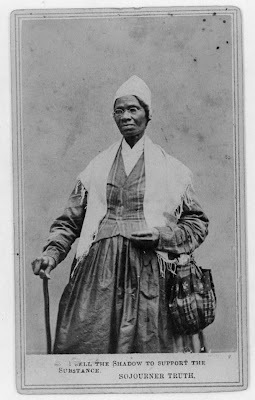
Ain't I A Woman?
During the mid 1970's, a poster depicting Sojourner Truth hung in my living room. It contained an abbreviated version of her most famous speech, and my young daughter learned it by heart.
I am continually astonished that people like her are not on the lips of every child when they name their heroes. It is only by suppression of the truth -- her Truth -- that this can be so.
Day before yesterday, a bust of Sojourner Truth joined those honored in the U.S. Capital. She's one of very few women to be represented, and the first African-American woman. There are no statues of Asian or Hispanic women.
Sojourner Truth was born into slavery, owned by a Dutch family in New York in 1797. She had an unimaginably hard time of it. After emancipation, she became a traveling preacher who electrified those who heard her speak. In honor of her new incarnation, she renamed herself Sojourner Truth. Click on her name to read her full biography, but briefly: During her life she worked tirelessly for abolition, recruiting blacks for the Union Army, tried to secure land grants for former slaves, and when she went to meet President Lincoln in 1864, she took the opportunity to attempt desegregation of Washington DC streetcars. (A hundred years before Rosa Parks.) She twice tried to vote in Presidential elections, she spoke relentlessly for women's rights, and she argued against capital punishment and for temperance.
Her best known words came at the Women's Convention in Akron, Ohio in 1851:
Well, children, where there is so much racket there must be something out of kilter. I think that 'twixt the negroes of the South and the women at the North, all talking about rights, the white men will be in a fix pretty soon. But what's all this here talking about?Michelle Obama was present to unveil the bust in the Emancipation Hall of the U.S. Capitol, to welcome the sculptor Artis Lane, and make the remarks on this occasion. Below is the CNN video of her comments. She stumbles a few times, but hear the emotion in her voice when she refers to her daughters and when she speaks to the children present.
That man over there says that women need to
be helped into carriages, and lifted over ditches, and to have the best place everywhere. Nobody ever helps me into carriages, or over mud-puddles, or gives me any best place! And ain't I a woman? Look at me! Look at my arm! I have ploughed and planted, and gathered into barns, and no man could head me! And ain't I a woman? I could work as much and eat as much as a man - when I could get it - and bear the lash as well! And ain't I a woman? I have borne thirteen children, and seen most all sold off to slavery, and when I cried out with my mother's grief, none but Jesus heard me! And ain't I a woman?
Then they talk about this thing in the head; what's this they call it? [member of audience whispers, "intellect"] That's it, honey. What's that got to do with women's rights or negroes' rights? If my cup won't hold but a pint, and yours holds a quart, wouldn't you be mean not to let me have my little half measure full?
Then that little man in black there, he says women can't have as much rights as men, 'cause Christ wasn't a woman! Where did your Christ come from? Where did your Christ come from? From God and a woman! Man had nothing to do with Him.
If the first woman God ever made was strong enough to turn the world upside down all alone, these women together ought to be able to turn it back , and get it right side up again! And now they is asking to do it, the men better let them.
Obliged to you for hearing me, and now old Sojourner ain't got nothing more to say.





|